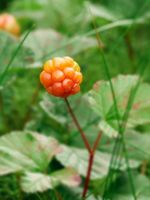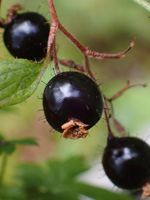Mon-Fri 9am - 5pm Mountain time
Cloudberry vs Bristly Black Currant
Rubus chamaemorus
Ribes lacustre
NOT AVAILABLE THIS SEASON - MIGHT RETURN
CUSTOM GROW
Cloudberry produces berries which taste tart and tangy with a sweet, floral hint. The berries have a creamy texture when overripe. They are often used to make jams, juices, and liquors. The berries are a pale red colour and when ripe turn more orange/amber. They do not grow very tall, generally reaching only 10-25 cm.
Cloudberry has distinct male and female plants. In order to produce berries, both must be present and pollinate with each other. Berries are produced at maturity, typically 5-7 years, and produce 1 berry per stem. The plant spreads naturally as they grow using modified underground stems (rhizomes), forming more plants over time in the same area.
This plant can be found wild in Canada’s boreal forest. In Newfoundland and Labrador, this plant is known as the Bakeapple and is a significant regional food. Similarly the Côte-Nord region of Quebec also has a long history of using this berry.
Note: Cloudberries require very specific soil conditions. They need well-drained soil with a pH between 3.5 and 5.0. Also sensitive to salt and dry conditions.
Note: Our seedlings are grown from seed and are too young to identify their sex.
Bristly Black Currant is a native deciduous shrub that grows in moist forests, swamps, and riparian areas. In summer, it produces clusters of dark purple to black berries that provide food for wildlife, while its reddish-purple flowers attract pollinators. The berries are technically edible and enjoyed by some, but many find them unpleasant and bitter.
Thriving in moist soils and shaded locations, Bristly Black Currant helps stabilize soil and supports diverse habitats. It is valuable for conservation plantings, wetland restoration, riparian buffers, and naturalization projects.
Note: When crushed, the berries are known to release an offensive odour.
Cloudberry Quick Facts
Bristly Black Currant Quick Facts
Toxicity: prickles may cause an allergic reaction

